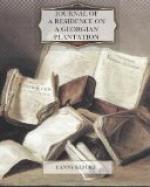Dear E——. Minuteness of detail, and fidelity in the account of my daily doings, will hardly, I fear, render my letters very interesting to you now; but cut off as I am here from all the usual resources and amusements of civilised existence, I shall find but little to communicate to you that is not furnished by my observations on the novel appearance of external nature, and the moral and physical condition of Mr. ——’s people. The latter subject is, I know, one sufficiently interesting in itself to you, and I shall not scruple to impart all the reflections which may occur to me relative to their state during my stay here, where enquiry into their mode of existence will form my chief occupation, and, necessarily also, the staple commodity of my letters. I purpose, while I reside here, keeping a sort of journal, such as Monk Lewis wrote during his visit to his West India plantations. I wish I had any prospect of rendering my diary as interesting and amusing to you as his was to me.
In taking my first walk on the island, I directed my steps towards the rice mill, a large building on the banks of the river, within a few yards of the house we occupy. Is it not rather curious that Miss Martineau should have mentioned the erection of a steam mill for threshing rice somewhere in the vicinity of Charleston as a singular novelty, likely to form an era in Southern agriculture, and to produce the most desirable changes in the system of labour by which it is carried on? Now, on this estate alone, there are three threshing mills—one worked by steam, one by the tide, and one by horses; there are two private steam mills on plantations adjacent to ours, and a public one at Savannah, where the planters who have none on their own estates are in the habit of sending their rice to be threshed at a certain percentage; these have all been in operation for some years, and I therefore am at a loss to understand what made her hail the erection of the one at Charleston as likely to produce such immediate and happy results. By the bye—of the misstatements, or rather mistakes, for they are such, in her books, with regard to certain facts—her only disadvantage in acquiring information was not by any means that natural infirmity on which the periodical press, both here and in England, has commented with so much brutality. She had the misfortune to possess, too, that unsuspecting reliance upon the truth of others which they are apt to feel who themselves hold truth most sacred: and this was a sore disadvantage to her in a country where I have heard it myself repeatedly asserted—and, what is more, much gloried in—that she was purposely misled by the persons to whom she addressed her enquiries, who did not scruple to disgrace themselves by imposing in the grossest manner upon her credulity and anxiety to obtain information. It is a knowledge of this very shameful proceeding, which has made me most especially anxious to avoid fact hunting. I might fill my letters to you with accounts received




